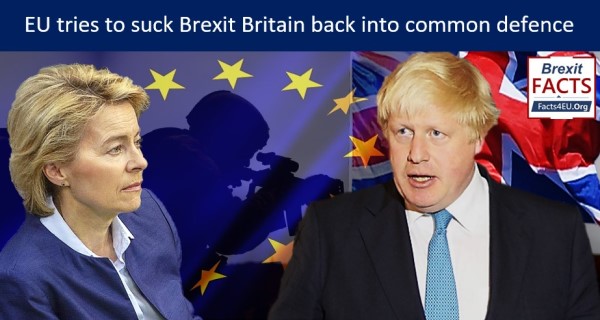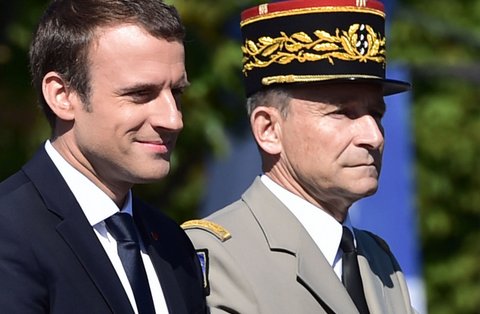EU uses Ukraine crisis to hustle Britain
Offer of chairing new EU Security Council is a trap to entangle UK

Montage © Facts4EU.Org 2022
Having failed over its Russia-Ukraine foreign policy the EU tries to suck Brexit Britain back into common defence
Some European Union leaders are making it known through briefings to the British media that they wish the UK to chair a new EU-led security council in the belief that this will lower tensions between the EU and its former member.
Called a “European Security Council”, the plans are reportedly being pulled together by Germany, the Netherlands, and Poland with the temptation of the UK being given a prime role.
Meanwhile the ‘EU Army’ grows ever closer
Meanwhile in Brussels yesterday the talk was all about common defence. In a 22-page document the Commission unveiled significant actions to contribute to EU defence, boost innovation and address strategic dependencies.
“Achieving our goals is only possible by developing, procuring, and operating military equipment together.”
- ‘Commission contribution to European defence’, EU Commission, Brussels, 15 Feb 2022
This new document comes just weeks before an EU defence summit which will be hosted in Paris by President Macron. The summit is expected to agree the EU Commission’s “Strategic Compass” on defence – a set of proposed policies published last year.
Regular readers will know that Facts4EU.Org has researched and published more reports on the EU's military ambitions than any other pro-Brexit organisation, and so the latest EU moves will come as no surprise.
Some EU leaders now want to cosy up to Boris
The sweet mood music being played by the EU is that years of bitterness following Brexit can be put behind “us” so that security and global co-operation can ensure that “Europe is better positioned” to handle world crises like the pandemic and the threats posed to Ukraine. This is accompanied by flattery about how well the UK has handled the Ukraine crisis and has sought to work flexibly with European allies.
Emmanuel Macron is not one of them
It is also being briefed that French President Emmanuel Macron is opposed to the plan to have such a security council and that not all EU members will be invited to attend, with only those meeting “strict criteria” such as having a high level of defence spending being considered suitable. Norway and western Balkan states are said to be amongst those non-EU countries that will be included in the plans.

No doubt these factors are meant to reassure and impress UK politicians, not least because the siren approaches are being made through the media for all to see.
It is also reported that Prime Minister Boris Johnson is “generally very keen” on more bilateral relationships with European countries outside the EU’s institutions and that this security council provides a stage on which to take part. On closer inspection the offer is only to chair the first meeting of the ‘security council’ as it will be a rotating Presidency.
If the report about Macron’s opposition to the security council is accurate and not a bluff (would it not be seen as an insult that he would not be chairing the Council?) then it only serves to illustrate the division within the EU on its security and foreign policy – and the Ukraine issue has shown the division is deep and rankerous.
Brexit Facts4EU.Org Summary
So, what happened to the argument that diplomatically the UK
would be ignored and unimportant if we left the EU?
- The fact is the UK offers a number of highly attractive assets and strengths:
- UK defence spending in percentage of GDP and volume is regularly the highest in Europe;
- The UK’s security and intelligence, and its coveted relationship as part of the five eyes intelligence network (US, UK, Canada, Australia and New Zealand) is seen as highly advantageous for the European countries. While the UK cannot easily share its intelligence with others the other states can tell the UK’s judgements and strategic approach are based upon “what it knows”. This lends weight and credibility to its posture.
- While the UK’s diplomatic network remains substantial and it is a leading soft power, it’s defence capability has international reach and its military technology industries are of premier rank. At the same time the EU is divided on its approach to Ukraine, or more importantly how to respond to Russia’s military manoeuvring. Germany recently would not give permission for the RAF to conduct an airlift of anti-tank weapons to Ukraine by flying through its airspace. The RAF chose not to make the request in the end and flew across international waters and then south through Poland.
- While Germany has sought to avoid talk of conflict with President Putin – not surprising given how it depends on the Russian Federation for a large proportion of its gas supplies – the French continue to argue there is no Russian threat. This is not believed by the East European EU members and especially the Baltic states.
Observations
Yet again when confronted with an international conflict the EU’s foreign policy capabilities are found wanting. The clunky and conflicted decision making of 27 states makes it almost impossible to reach a consensus on how to proceed. When it does, the one-size-fits-all response is often a meek compromise and slow to materialise.
Having failed to attract the UK into its security and mutual defence programmes – the euphemisms for the EU foreign policy having a military capability most people would recognise as an army – the ‘European Security Council’ now being suggested in the media would usefully serve the purpose of pulling UK foreign policy into the EU’s embrace and compromise the ability to act in the UK’s national interests.
The UK must give the idea short shrift. How can the EU have the nerve to want the UK’s help to solve continental European issues when it has conspired to split our country in two with a border down the middle of the Irish Sea?
The US now sees the UK has heft and is its most reliable ally
Meanwhile in Washington the mood is shifting – even Democrat and State Department critics of Brexit are voicing their pleasure that the UK is leading the line in resisting Russian intimidation and saying they may well have overestimated the impact of the UK leaving the EU. In particular it is being noted how quickly the UK is able to act and take decisions rather than be held back by the slowest ship in the EU convoy.
The Russian-Ukrainian impasse about Ukraine’s eventual EU and NATO memberships – the former planned in the next few years and the latter a prospect that ignites Putin’s fury – may yet lead to nothing. However it has been a timely reminder (as if it were needed) that NATO should be the UK’s sole military alliance – not some EU army in disguise. Nor should any dalliance with EU meet and greet sessions that can put pressure on the UK to conform to the Brussels foreign policy view be countenanced.
The truth is that the EU’s plan for a ‘European Security Council’ goes back a long way. This is a long-standing EU initiative and just the latest in many attempts by Brussels and Foreign Office/MOD officials – acting in concert with UK Rejoiners – to bounce us back into EU defence structures that we have only just left.
There can be no such thing as UK leadership of a ‘European Security Council’ as everything in EU Common Security and Defence is done on the EU’s terms with EU interests paramount. It would be a binary relationship with which to point the UK towards EU participation but with no reciprocal obligation for EU to take heed of the UK’s views. The UK needs to be saying very firmly that any such format duplicates NATO and is unwelcome.
Researching these details and strategies does not come cost free…
Facts4EU.Org needs your financial support today
We are a 'not for profit' team (we make a loss) and any donation goes towards the actual work, not plush London offices, lunch or taxi expenses, or other luxuries of some organisations.
We badly need more of our thousands of readers to donate – no matter how small an amount it all helps. Could this be you, today? Maybe you've been thinking about it, but just haven't got around to doing it? If so, let us reassure you. It's quick and easy and we use two highly secure payment providers. And we do NOT ask you for further donations if you donate once - we just hope that you keep supporting us. Your donation stays anonymous unless you tell us otherwise.
Please don't assume that other people will keep us going - we don't receive enough to survive and we need your help today. Could you help us?
Most of our readers are well-informed and appreciate our fact-based articles, presented in a way you won't see anywhere else. If you value reports like the one above, please help our work with a donation. We have far more to do in researching, publishing, campaigning and lobbying Parliament than we have in terms of the financial resources to fulfil these tasks. We badly need funding to continue - we rely 100% on public donations from readers like you.
If you believe in a fully-free, independent, and sovereign United Kingdom, please make a donation now. It’s quick, secure, and confidential, and you can use one of the links below or you can use our Donations page here. You will receive a personal, friendly ‘thank you’ from a member of our team within 24 hours. Thank you for reading this.
[ Sources: EU Commission | EEAS | Daily Telegraph ] Politicians and journalists can contact us for details, as ever.
Brexit Facts4EU.Org, Wednesday, 16 February, 2022
Click here to go to our news headlines
Please scroll down to COMMENT on the above article.
And don't forget to actually post your message after you have previewed it!
Since before the EU Referendum, Brexit Facts4EU.Org
has been the most prolific researcher and publisher of Brexit facts in the world.
Supported by MPs, MEPs, & other groups, our work has impact.
We think facts matter. Please donate today, so that we can continue to ensure a clean Brexit is finally delivered.
Paypal Users Only - Choose amount first
Quick One-off
Monthly


Something to say about this? Scroll down for reader comments